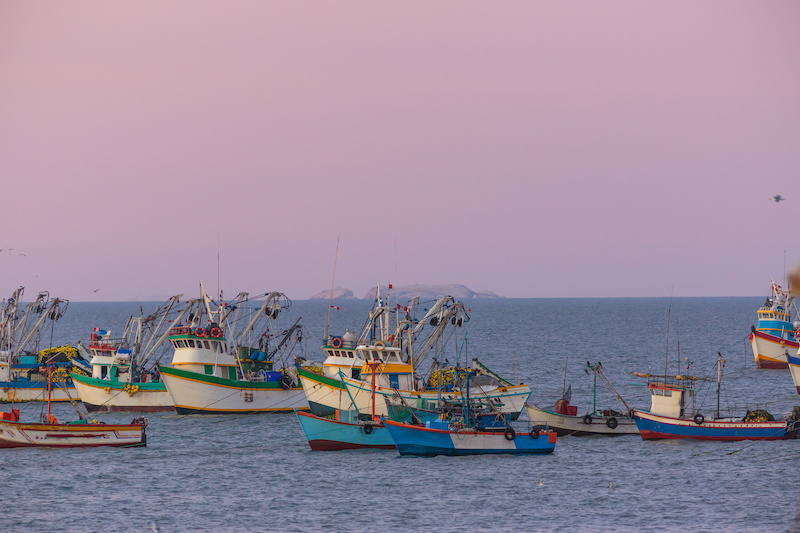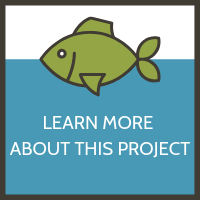
By Alaina Dismukes
The Feed the Future Innovation Lab for Fish has a new activity to support the USAID research agenda on Distant Water Fleets (DWFs), or fishing fleets that operate outside their countries’ exclusive economic zones. The new research activity will examine jumbo squid in Peru, round scad in the Philippines, a multi-species tuna stock in Madagascar, and skipjack tuna in the Pacific Islands region.
Led by researchers from the University of Rhode Island, the work is funded through a USAID $200,000 buy-in award and is being implemented in a collaboration between the Bureau for Resilience and Food Security and the Bureau for Development, Democracy, and Innovation.
“This cross-divisional collaboration is great because fisheries are by nature cross-sectoral,” said Elin Torell, the project’s lead principal investigator and the Fish Innovation Lab’s deputy director. “Fisheries are critical for food security, but it is also important from a biodiversity and natural resource management perspective. Many programs tackle fisheries from one perspective (maximizing nutrition and food security or biodiversity conservation). When we collaborate, we acknowledge that fisheries for food security and biodiversity conservation are all part of the same system.”
USAID missions that are engaged in fisheries programming try to assess the threats and drivers that lead to unsustainable harvesting to inform and design development interventions. In recent years, USAID staff have raised questions about the extent to which harvesting by DWFs threatens sustainable fisheries in the countries where they work.
“Distant Water Fleets are an issue because they take fish resources that are needed by the local population for food security,” Torell said. “Additionally, the revenue of distant water fleet fishing ends up in foreign countries or companies rather than with the country where the fishing happens.”
Some DWF vessels are known to engage in illegal, unregulated, or unreported fishing, while others may engage in harvesting practices that are legal but unsustainable. It is not always clear whether the licenses that allow unsustainable activity are the result of weak data and technical analyses or of corrupting influence on issuing officials. Competition between DWFs and national fishers—which can result in conflict, perceptions of unfair resource allocation, or the undermining of local economies and food security—can erode domestic support for management rules.
The 18-month Fish Innovation Lab project has two major objectives. The first is to build an understanding of the ecological and social-economic impacts of DWFs operating within the exclusive economic zones of the four target countries.
“In particular, we aim to determine the extent to which distant water fleets currently affect stock-specific fish availability at the local level and estimate the extent to which changes in distant water fleets' fishing policy could improve food security,” Torell said.
“We will coordinate with local partners and fisheries experts to use catch reconstructions generated by the Sea Around Us research project. To assess and estimate the potential impacts of distant water fleets on food security, we will focus on food availability and access while considering various dimensions of food use (such as for human consumption) and specifics of the micro- and macronutrients associated with the main fish stock.”
The second objective is to evaluate the distant water fleet licensing and access right systems. This information will be used to develop roadmaps for improving sustainability and equity in licensing that are locally relevant.
“To accomplish objective two, we will develop a multi-criteria scorecard for evaluating strong licensing and access systems,” Torell said. “The scorecards will include multiple categories of evaluation criteria, including transparency, negotiation capacity, and access pricing, among others.”
With this research, the project will help identify the specific trade-offs between DWF activity and domestic fishing that affect food security in Peru, the Philippines, Madagascar, and the Pacific Islands region. The results will equip local advocates with more information to strengthen their national licensing systems and increase fisheries sustainability.
“The Fish Innovation Lab is very pleased to implement an activity that addresses the missions of both the USAID Bureau for Resilience and Food Security and the Bureau for Development, Democracy, and Innovation,” said Mark Lawrence, director of the Fish Innovation Lab. “This activity is not only expanding the number of countries the Fish Innovation Lab is impacting, but it is also accomplishing the dual roles of improving sustainability and addressing food security.”
Published on June 8, 2022

